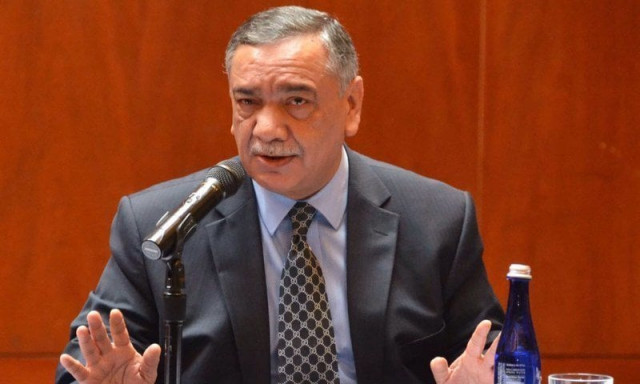At the Supreme Court, change is in the air
New CJP Khosa has already made a few notable changes in the workings of the court

CJP Asif Saeed Khosa. PHOTO: SC
Focus on criminal justice
Since taking oath as the top judge on January 18, Justice Khosa, who has a strong command on criminal jurisprudence, has regularly highlighted flaws in the criminal justice system, wherein investigation, prosecution, and judiciary are the main components. Likewise, he believes that false witnesses should be punished.
The three-judge bench headed by CJP Asif Saeed Khosa and comprising Justice Qazi Faez Isa and Justice Mazhar Alam Khan Miankhel on Tuesday again raised the issue of false witnesses in the Asia Bibi case. Justice Khosa noted that under the law, in death penalty cases, a false witness could be sentenced to life imprisonment after conducting a summary trial. The CJP on Tuesday lamented that both lower courts and the LHC overlooked discrepancies in the statements of witnesses in the Aasia Bibi case. The CJP, while hearing criminal appeals, has consistently said that false witnesses are the biggest obstacle in the criminal justice system.
It is well-known that the courts do not use perjury laws to discourage false witnesses. The incumbent CJP, however, is determined to 'build dams' against false witnesses.
Questioning high court judgments
Likewise, the chief justice is also questioning the high courts’ rulings on criminal laws. Justice Khosa took a strong stance on the Lahore High Court for misreading evidence in the Khadija stabbing case. Likewise, he also questioned the Islamabad High Court ruling regarding the grant of bail to former prime minister Nawaz Sharif in the Avenfield case. Last week, CJP Khosa wondered that how a high court can ignore important evidence in a rape case. He also said that a judge who is unable to dispense justice must go home.
Change of courtroom atmosphere
Unlike his predecessor, former CJP Saqib Nisar, there have been no exchanges of harsh words between the bench and lawyers in any matter during the last two weeks. There has also been no grilling of public office holders. Likewise, Courtroom No 1 has not been packed in since January 18. SC judges, who were sidelined during Justice Nisar’s tenure, have been made part of benches which heard high profile cases. Justice Syed Mansoor Ali Shah was part of the bench which heard the Khadija case, while another outspoken judge, Justice Qazi Faez, was included in the special bench which dismissed the review petition against the acquittal of Aasia Bibi.
Judicial restraint
Unlike his predecessor, Justice Khosa has not heard any public interest matter so far. In fact, since his appointment as CJP, no constitutional petition has been entertained by the SC registrar’s office. Only three constitutional petitions have been registered this month, all of them while former CJP Nisar was still in office.
The SC Human Rights Cell (HRC) has also changed its liberal policy on the entertaining of applications. Even most of the staff has been posted to other sections of the apex court. Likewise, no suo motu has been taken by CJP Khosa. Legal experts appreciated the CJP’s approach, saying that when the proper forums are available, then there is no need for the SC to intervene.
Likewise, the SC under Justice Khosa is also avoiding involving the Supreme Court in political matters. This is illustrated by the court’s refusal to entertain constitution petitions filed by PTI leaders seeking the disqualification of former president Asif Ali Zardari. The SC registrar office returned the petition by raising objections. Later the PTI leaders approached the Islamabad High Court on the same issue. Older cases of public interest, however, are still being fixed in different benches.
On a related note, it has also been learnt that a flood of review petitions against former chief justice Nisar’s judgments has opened after his retirement.
Video link trials
Sources said the apex court is preparing to establish video links soon between its branch registries and the principal seat, through which lawyers may address arguments in the courtrooms of the branch registries and the appropriate benches of the court may hear those arguments at the principal seat in real time and decide cases. A senior official revealed that hearings through video links will be conducted soon.
In his first speech, the CJP said that such innovations may reduce inconvenience and huge expenses on the part of all concerned, besides diminishing delays caused by non-availability of benches at the branch registries of the court.
Interestingly, sources also said that there are proposals to begin a process whereby show cause notices may be issued to superior court judges on the basis of inefficiency.
Also of note is the fact that since the new CJP has assumed office, no press release has been issued about his activities.


1724319076-0/Untitled-design-(5)1724319076-0-208x130.webp)
















COMMENTS
Comments are moderated and generally will be posted if they are on-topic and not abusive.
For more information, please see our Comments FAQ